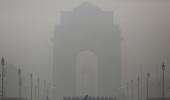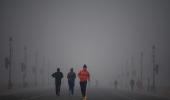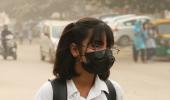Over eight million deaths in 2021 were attributed to air pollution, affecting both children and adults alike.

Air pollution continues to be a formidable silent threat, responsible for nearly 464 deaths of children under five in India and 2,000 young lives daily worldwide, according to the latest State of Global Air 2024 report.
Surpassing poor sanitation and inadequate clean water, air pollution now ranks as the second leading health hazard for children worldwide.
The latest findings from US-based research organisation Health Effects Institute (HEI) reveals that over eight million deaths in 2021 were attributed to air pollution, affecting both children and adults alike.
The State of Global Air 2024 report, an annual publication jointly produced by HEI and Unicef, highlights the stark reality that dirty air now ranks as the second-largest global killer, following closely after high blood pressure.
Among children under five years, air pollution is the second leading cause of death after malnutrition.

Pallavi Pant, lead author of the report and head of global health at HEI, emphasised the severe disparities revealed, "Far too much of the burden [is] borne by young children, older populations, and low and middle income countries."
The primary culprit identified by the report is PM2.5, fine particles smaller than 2.5 micrometres in diameter, which are responsible for over 90 per cent of air pollution-related deaths globally.
These particles infiltrate the bloodstream, impacting organs and contributing to a spectrum of diseases from lung and heart conditions to diabetes and dementia.
Generational impact of air pollution
Kitty van der Heijden, deputy executive director of Unicef, warns of the profound generational impact of our inaction: 'Our inaction is having profound effects on the next generation, with lifelong health and wellbeing impacts.'
'The global urgency is undeniable. It is imperative that governments and businesses consider these estimates and locally available data and use it to inform meaningful, child-focused action to reduce air pollution and protect children's health,' she said.
The report also links worsening air quality to the climate crisis, citing severe droughts, wildfires, and dust storms as exacerbating factors.
These events release particles that persist in the air, worsening health outcomes globally.
Addressing air pollution not only saves lives but also benefits the climate.
Approximately half a million deaths among children in 2021 were linked to indoor air pollution from cooking with dirty fuels, including biomass, charcoal, paraffin and coal.
Transitioning to cleaner alternatives like solar cookstoves could significantly reduce emissions and improve health outcomes.
Solutions in access to clean cooking fuels
Despite these challenges, significant gaps remain, with 2.3 billion people lacking access to clean cooking fuels worldwide.
The International Energy Agency estimates a $4 billion annual investment is needed to solve this issue by 2030, particularly in sub-Saharan Africa.
Fatih Birol, executive director of the IEA, urged global leaders to prioritise this issue, stressing its broad impacts on health, climate, and economies, as well as its disproportionate burden on women and girls tasked with gathering firewood.
The State of Global Air report draws on data from the Global Burden of Disease study, covering over 200 countries.
Previous reports have highlighted that nearly every person breathes unhealthy levels of air pollution daily, with half a million infant deaths annually attributed to polluted air.
Feature Presentation: Ashish Narsale/Rediff.com












 © 2025
© 2025